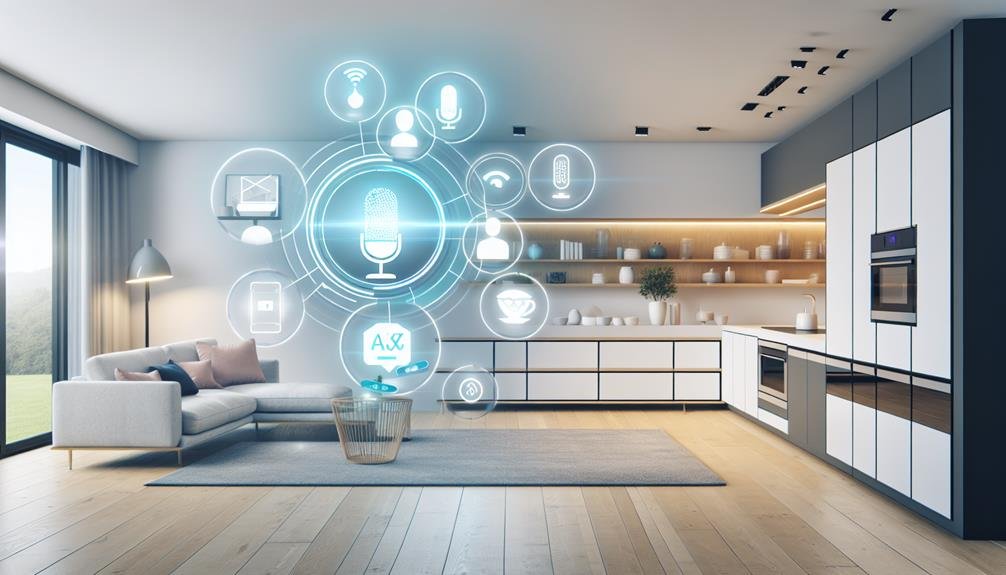In the not-too-distant future, your home will no longer be just a physical space, but a living entity that adapts to your every need. As technology continues to evolve at a rapid pace, smart home automation is poised to revolutionize the way we live.
From voice-controlled assistants to the integration of artificial intelligence, the possibilities are endless. But what exactly does the future hold for smart home automation? What are the predictions and trends that will shape our homes in the coming years?
Step into the world of tomorrow and discover the exciting possibilities that await you.
Key Takeaways
- Advances in voice-controlled technology have made virtual assistants more human-like, convenient, and efficient.
- The integration of artificial intelligence enhances the functionality and capabilities of smart home devices, enabling personalized recommendations and automation.
- The expansion of IoT devices allows for seamless connectivity and communication, leading to more innovative and interconnected devices entering the market.
- Enhanced energy efficiency solutions, such as smart thermostats and automated lighting control, contribute to a greener environment and save money.
Advances in Voice-Controlled Technology
Voice-controlled technology has made significant advancements in recent years, revolutionizing the way you interact with your smart home automation systems. One of the key breakthroughs in this field is the development of natural language processing (NLP) capabilities.
NLP enables virtual assistants, like Amazon Alexa and Google Assistant, to understand and respond to your commands and questions in a more human-like manner. Gone are the days of robotic and scripted responses; these virtual assistants can now engage in more natural and dynamic conversations.
With NLP, you can simply speak to your smart home devices, using everyday language, and they'll understand your intentions. Whether you want to dim the lights, adjust the temperature, or play your favorite music, you can do it effortlessly with just your voice. The accuracy and efficiency of voice-controlled technology have improved significantly, allowing for seamless integration with other smart home devices and systems.
Virtual assistants have become more than just voice-controlled gadgets. They've become your personal concierge, helping you manage your day, providing you with information, and even entertaining you with jokes and stories.
The advancements in voice-controlled technology have brought a sense of freedom and convenience to your daily life, allowing you to effortlessly control your smart home automation systems with a simple command.
Get ready to experience the future of smart home automation, where your voice is the ultimate remote control.
Integration of Artificial Intelligence
Artificial intelligence has become an integral part of smart home automation, enhancing the functionality and capabilities of your devices. AI-powered virtual assistants, such as Amazon's Alexa, Google Assistant, or Apple's Siri, have revolutionized the way we interact with our smart homes. These virtual assistants use machine learning algorithms to understand and respond to your voice commands, allowing you to control various aspects of your home, from adjusting the thermostat to turning on the lights, all with a simple voice command.
The integration of AI in smart home automation goes beyond voice control. Machine learning algorithms enable your smart devices to learn your preferences and habits over time. This allows them to anticipate your needs and automate tasks accordingly. For example, your smart home system might learn that you like to have the lights dimmed and the temperature lowered in the evening. With AI, your smart home can automatically adjust these settings without you having to lift a finger.
Furthermore, AI-powered virtual assistants can also provide personalized recommendations and suggestions based on your preferences and habits. They can offer insights on energy usage, suggest ways to optimize your home's efficiency, and even help you create a more comfortable and secure living environment.
Expansion of IoT Devices
With the rapid advancements in technology, the Internet of Things (IoT) has experienced a significant expansion, leading to a multitude of smart devices that can seamlessly connect and communicate with each other. This growth in IoT devices has had a profound impact on smart home connectivity and remote monitoring.
Smart home connectivity has become more accessible and convenient than ever before. From smart thermostats that can be controlled remotely to smart security systems that allow you to monitor your home from anywhere in the world, the possibilities are endless. With the expansion of IoT devices, you can now control and automate various aspects of your home, such as lighting, appliances, and even your garage door, all from a single app on your smartphone.
Remote monitoring has also improved with the expansion of IoT devices. You can now monitor your home's security cameras, check on your pets with smart pet cameras, and even receive alerts when there are any unexpected changes or emergencies in your home. This level of connectivity and remote monitoring provides peace of mind, knowing that you can always keep an eye on your home and loved ones, no matter where you are.
As the IoT continues to expand, we can expect even more innovative and interconnected devices to enter the market. The future of smart home automation looks promising, with advancements in technology making our lives easier, more efficient, and more connected than ever before.
Enhanced Energy Efficiency Solutions
With the expansion of IoT devices in smart home automation, another important aspect to consider is the implementation of enhanced energy efficiency solutions. As more and more devices are connected to the internet, the need for sustainable living and smart grid integration becomes crucial. By optimizing energy usage and reducing wastage, these solutions not only help you save money but also contribute to a greener environment.
Here is a visual representation of the enhanced energy efficiency solutions:
| Solutions | Description | Benefits |
|---|---|---|
| Smart thermostats | These devices learn your preferences and adjust the temperature accordingly, saving energy and reducing costs. | Energy savings, cost reduction |
| Energy monitoring systems | These systems provide real-time insights into your energy consumption, allowing you to identify areas of improvement and make informed decisions. | Increased awareness, better energy management |
| Automated lighting control | With the ability to schedule and remotely control your lights, you can reduce unnecessary usage and save energy. | Energy conservation, convenience |
Smart grid integration plays a vital role in enhancing energy efficiency. It enables the seamless communication between your home and the power grid, allowing for optimized energy distribution and load management. By leveraging this technology, you can take advantage of off-peak electricity rates and reduce your carbon footprint.
Security and Privacy Concerns
Security and privacy concerns are crucial considerations in the realm of smart home automation. As technology advances and our homes become more connected, it's essential to address the potential risks associated with data breaches and protect our personal information.
Here are some key points to consider:
- Data breaches: With the increasing amount of data collected by smart home devices, the risk of data breaches also grows. Hackers may target vulnerable devices to gain access to personal information or disrupt the functionality of the system. It's crucial to choose reliable and secure devices from reputable manufacturers to minimize the risk of data breaches.
- User authentication: Ensuring proper user authentication is essential to maintain privacy and security in smart homes. Strong passwords, two-factor authentication, and biometric identification methods can help prevent unauthorized access to smart home systems. By implementing these measures, you can ensure that only authorized individuals can control your smart home devices.
Protecting your smart home from potential security threats and safeguarding your privacy is of utmost importance. By staying informed about the risks, choosing secure devices, and implementing strong user authentication methods, you can enjoy the benefits of smart home automation without compromising your security and privacy.





